 I was a little surprised by the invitation I received from Hernan Ortiz and Viviana Trujillo to speak at their annual Fractal conference . I couldn’t figure out how they knew that I was interested in all the things their conference was about: science fiction, technoculture, music and the porous boundary between fiction and real lived life. I knew that my current work at the Norman Lear Center was informed by these interests – which I’d cultivated while I was earning my English PhD in a theory-heavy program – but it was hardly obvious in any official bio you might find online.
I was a little surprised by the invitation I received from Hernan Ortiz and Viviana Trujillo to speak at their annual Fractal conference . I couldn’t figure out how they knew that I was interested in all the things their conference was about: science fiction, technoculture, music and the porous boundary between fiction and real lived life. I knew that my current work at the Norman Lear Center was informed by these interests – which I’d cultivated while I was earning my English PhD in a theory-heavy program – but it was hardly obvious in any official bio you might find online.
The conference was in Medellin, Colombia, and so I immediately contacted my friend, who has lots of family in Colombia, and asked her whether it was safe for an American gal to travel alone there. She assured me that things had improved tremendously: Medellin was now safer than it had been in decades, and it just happened to be one of the most beautiful places in the entire country.
Boy, she wasn’t kidding.
Hernan and Viviana were clever enough to include in their original invitation links to two glowing reports about the two previous conferences in 2009 and 2010. Science fiction writers John Kessel and James Patrick Kelly wrote this about the first Fractal:
The festival blithely crossed boundaries in the arts, exploring the literature of the fantastic, music, art, science, technology, and fashion. It was Colombia’s first national science fiction conference. Dedicated to presenting different ways of imagining and creating the future, the conference took its mission from a quote by J.G. Ballard. “I believe in the power of imagination to rebuild the world.”
Talk about interdisciplinary: the 2009 event included a futuristic fashion show (inspired by a cyberpunk story), musical performances by the rock band NULL and the Medellin Philharmonic, and talks about the singularity, genetic manipulation, Mary Shelley, chaos theory and Gabriel Garcia Marquez.
Can someone please tell me what other conferences attempt to cover such fascinating and diverse territory?
Needless to say, I couldn’t wait to go, and upon arrival, I was immediately swept into the hurricane that is Fractal, a truly unique conference – not only because of its radical interdisciplinarity, but also because of the imaginative way that it engaged so many disparate communities (more on that in Part 2).
I was thrilled to hear that John Kessel would be attending the conference again. In addition to being a prominent science fiction author, Kessel is also an English literature professor, and he gave a great talk about the way in which science fiction writers either consciously or unconsciously embed messages about the present into their futuristic fiction. I was reminded of an excellent essay by Leo Braudy in a book I edited, Warners’ War: Politics, Pop Culture & Propaganda in Wartime Hollywood. Here, Braudy argues that the “escapist” movies of the 30’s were often allegories about the rise of fascism in Europe:
In the 1930s, with the gathering storms of war in Europe, Warner Bros. movies in particular begin to mediate between the actual life of their audiences and the more general public life of politics and world events. Instead of escapism, the films, both prestige and genre varieties, were more like special lenses through which to read otherwise excessively complex events. Like the lens of political science or economics for an academic observer, they offered an interpretive matrix. Different studios over time developed their own attitudes toward this outside world. For a variety of reasons, Warner Bros. was the most explicit in its attitudes and its effort to take on the cultural role of amalgamating “entertainment” and “propaganda” to present a point of view on current events, using fictional stories and characters as well as a recognizably factual “history.”
One of the reasons that the Warners resorted to elliptical storytelling techniques was because they felt pressure to hide their politics from powerful government censors. But Braudy discusses the enchanting power of allegory and its ability to allow audiences to safely contemplate alternate realities without overtly questioning the wisdom of their own political present. Similarly, I’d say, science fiction authors have always benefitted from being at least one remove from the present moment.
One of the reasons that I was so excited about attending this conference is because I could tell that it was going to bring together a contingent of people who were interested in exploring the ways in which art and culture can not only re-present but actively re-shape the world. Hugo and Nebula finalist Kij Johnson gave a very thoughtful talk about how fiction is similar to an enigma machine, encoding the thoughts, ideas and emotions of a writer, which are ultimately decoded by readers. Her description of the tremendous intimacy of this exchange highlighted, for me, the (oft-forgotten) materiality of signification – the necessary physicality of both reading and writing. Her talk also fleshed out the theme of the conference – decoding the present, descifrando el presente – in a particularly surprising and imaginative way.
I asked Hernan and Viviana how they went about selecting people. Hernan said that they always tried to find out about the real person behind the public persona: after they saw my talk about fashion and intellectual property law on TED, they started poking around, reading the transcript of a panel discussion that I participated in at MIT about politics and popular culture. None of these topics were spot-on for the Fractal conference, but, reading between the lines, they figured me out pretty well. I think they were just as successful with the other panelists, too. Sam Poole, aka DJ SPL, had never given a talk at any event, but somehow they figured out that this globe-trotting DubStep DJ was an incredibly thoughtful and articulate guy . . . and very knowledgable about comics and sci fi. (His live show that closed the conference was a highlight of my entire, glorious three-week trek across South America.)
James Alliban, an expert on augmented reality, was also an excellent fit. I found out during one of many luscious meals (if you ever make it to Medellin, be sure to eat at Bijao) that he hadn’t touched a computer until after he turned 20. He’d been an art student – a painter and a sculptor – and, according to him, a very lazy guy who never bothered to figure out new technology. But once he started messing around with computer graphics tools he realized that brand new art forms awaited him and he soon learned how to code as well as design. He gave a wonderfully generous presentation, highlighting some of the more fascinating augmented reality apps out there, a few of which he has developed (be sure to check out Fracture, an iPhone app – soon to come to iPad, he promises me – which translates 2D photos into marvelous cubist style collages. Absolutely gorgeous stuff.) You can check out James’ diary about the event here.
I’m afraid I haven’t even scratched the surface yet (nor have I mentioned my talk on Entertainment as Virtual Reality and the impact of imitation). I’ll save that for Part Dos . . .





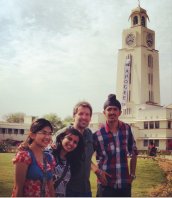



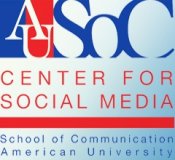

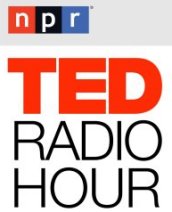
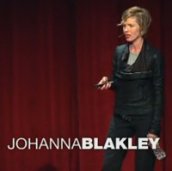


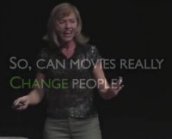
Wow, sounds tremendous, I love the idea of convening in a botanical garden! Thinking that LA needs something more like this, Festival of Ideas, BIL & Mindshare rolled into one…..in a botanical garden would be perfect, somewhere peaceful to explore.
What was your biggest inspiration that you could not wait to share with USC & colleagues?
Wouldn’t it be AMAZING if we could do something like this in L.A.?! Unfortunately, I think you almost have to be off the radar in order to pull something like this off. But we can dream . . .
As for key take-aways . . . I’d say I was induced to believe that the more experimental we’re willing to be, the more likely it is that we’ll grasp what’s going on in the world right now . . . and what’s right around the corner. Thinking futuristically is the only way to think practically about the present. Maybe it’s always been that way, but it seems more palpably true now than ever before! Very exciting times . . .